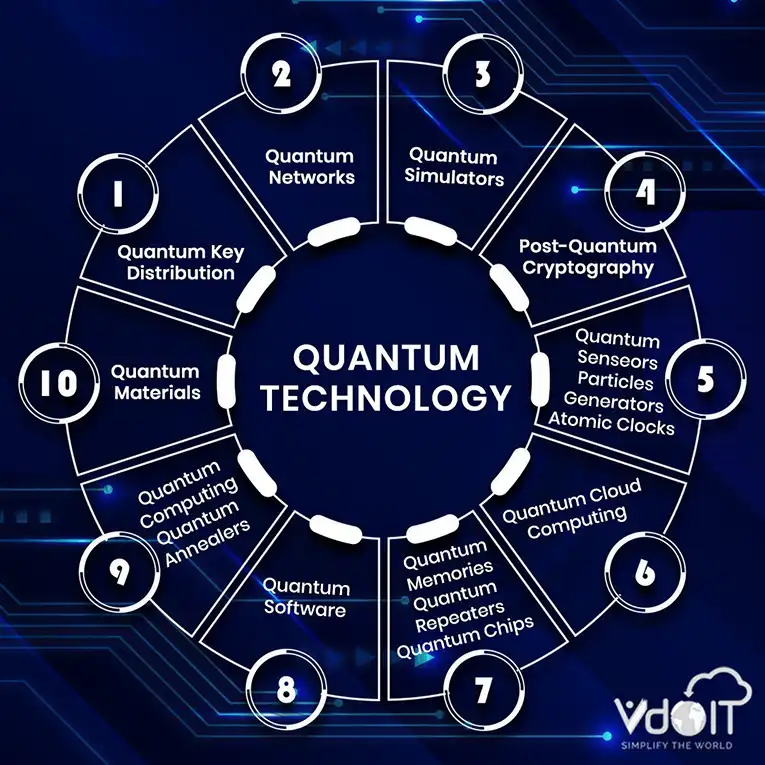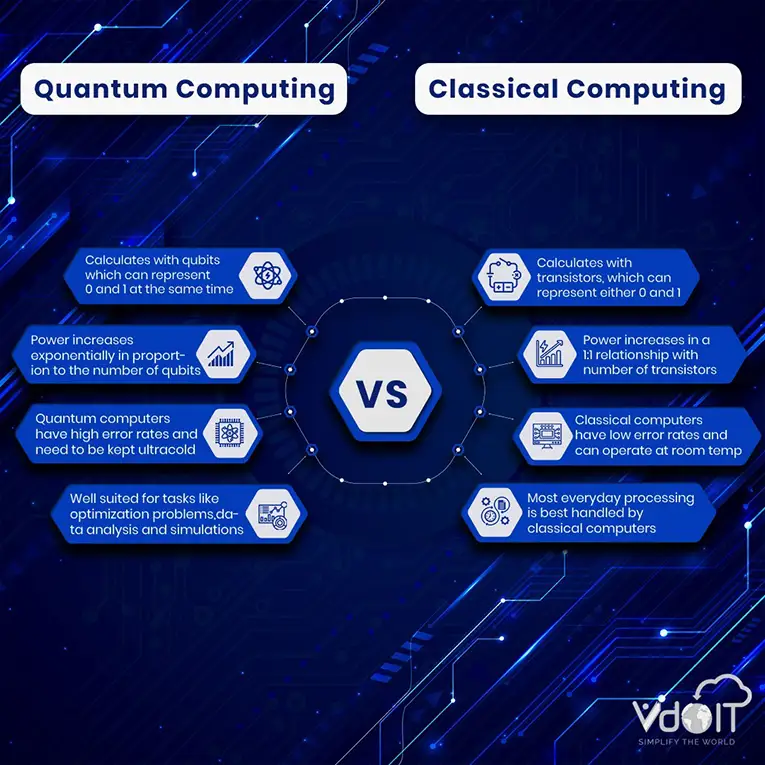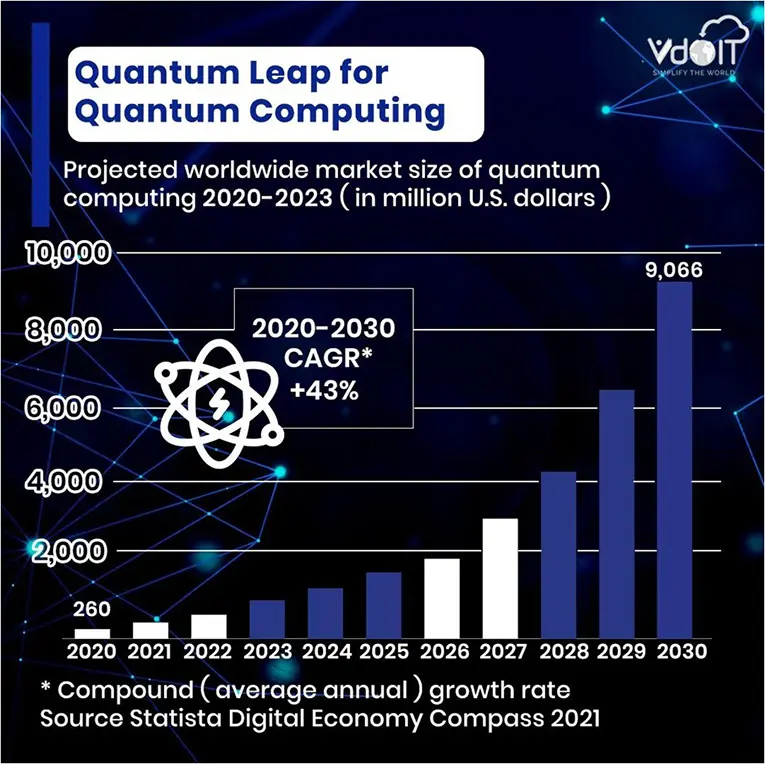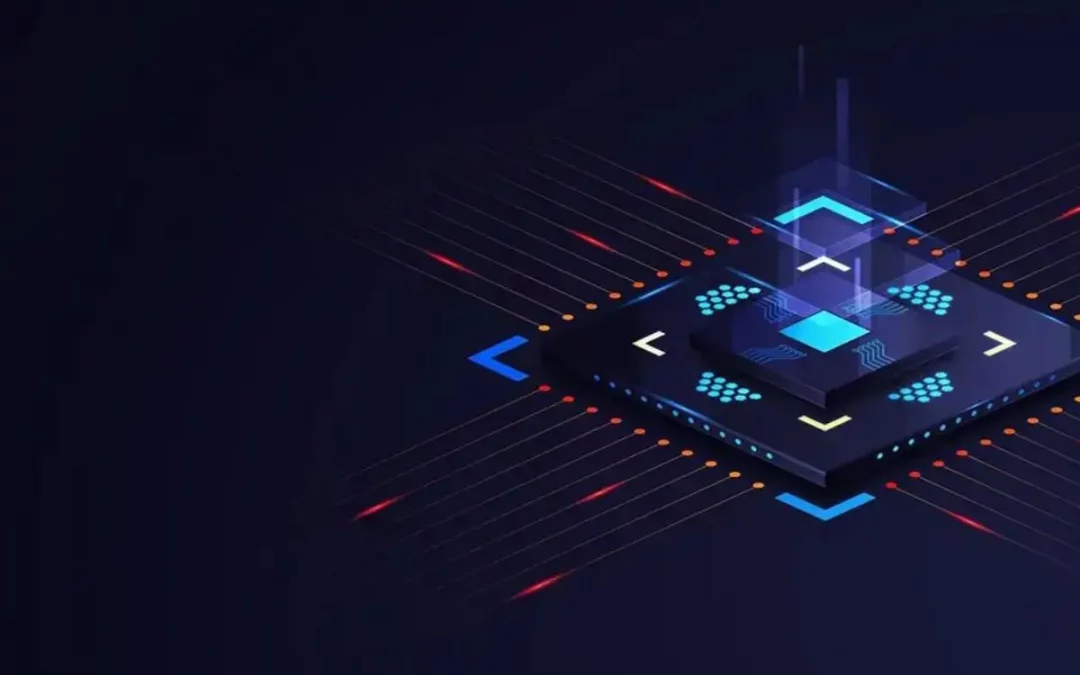Quantum computing is poised to revolutionize the world of technology. As classical computing approaches its physical limits, quantum computing offers a new paradigm that promises to solve complex problems exponentially faster than today’s best supercomputers. But what exactly is quantum computing, and why is it such a game-changer?
The Basics of Quantum Computing
To understand quantum computing, it’s essential to start with the basics of classical computing. Classical computers, which include everything from your smartphone to the world’s most powerful supercomputers, process information in binary bits. These bits can be in one of two states: 0 or 1. Operations are performed using logic gates that manipulate these bits to perform calculations and solve problems.
In contrast, quantum computing leverages the principles of quantum mechanics, a branch of physics that deals with the behavior of particles at atomic and subatomic scales. The fundamental unit of information in a quantum computer is the quantum bit, or qubit. Unlike classical bits, qubits can exist in multiple states simultaneously thanks to two key properties of quantum mechanics: superposition and entanglement.
| Concept | Description |
| Qubit | The basic unit of quantum information, analogous to a bit in classical computing, but can be in superposition of 0 and 1. |
| Superposition | A fundamental principle where a qubit can be in a combination of both 0 and 1 states simultaneously. |
| Entanglement | A quantum phenomenon where qubits become interconnected and the state of one can instantaneously affect the state of another, regardless of distance. |
| Quantum Gate | A basic quantum circuit operating on a small number of qubits, similar to classical logic gates. Examples include the Hadamard gate and Pauli-X gate. |
| Quantum Circuit | A sequence of quantum gates applied to qubits to perform a quantum computation. |
| Quantum Algorithm | A step-by-step procedure, used for calculation, data processing, and automated reasoning tasks in quantum computing. Examples include Shor’s algorithm and Grover’s algorithm. |
| Quantum Decoherence | The loss of quantum coherence, wherein the system transitions from a quantum state to a classical state due to interaction with the environment. |
| Quantum Error Correction | Techniques used to protect quantum information against errors due to decoherence and other quantum noise. |
| Quantum Supremacy | The potential ability of quantum computing devices to solve problems that classical computers practically cannot. |
| Quantum Computer | A device that performs quantum computations, leveraging principles like superposition and entanglement to process information. |

Superposition: Beyond Binary
Superposition allows a qubit to be in a combination of both 0 and 1 states at the same time. This means that a quantum computer with a few qubits can process a vast amount of information simultaneously. For instance, while a classical bit is like a coin lying flat on a table, showing either heads or tails, a qubit is like a spinning coin that shows both heads and tails at the same time.
This ability to represent multiple states simultaneously enables quantum computers to perform many calculations at once, dramatically increasing their processing power compared to classical computers. The number of states a quantum system can represent grows exponentially with the number of qubits.
For example, a system with 2 qubits can represent 4 states (00, 01, 10, 11), while a system with 3 qubits can represent 8 states, and so on.
Entanglement: Quantum Connections
Entanglement is another quantum phenomenon that plays a crucial role in quantum computing. When qubits become entangled, the state of one qubit becomes dependent on the state of another, no matter how far apart they are. This means that the measurement of one entangled qubit will instantaneously affect the state of its partner.
Entanglement enables qubits to work together in ways that classical bits cannot. This property allows quantum computers to perform complex calculations more efficiently. When qubits are entangled, information is shared among them, creating a powerful computational resource.
Quantum Gates and Circuits
Just as classical computers use logic gates to perform operations on bits, quantum computers use quantum gates to manipulate qubits. These gates control the probabilities of a qubit’s state, allowing quantum algorithms to be executed. Quantum gates are represented by matrices, and their operations are described using linear algebra.
Quantum circuits are the computational routines in quantum computing. They consist of a sequence of quantum gates applied to qubits. Designing efficient quantum circuits is crucial for the development of quantum algorithms that can solve real-world problems.
Quantum Algorithms
Several quantum algorithms have been developed to leverage the unique capabilities of quantum computers. Some of the most well-known algorithms include:
Shor’s Algorithm
Developed by Peter Shor in 1994, Shor’s algorithm is a quantum algorithm for factoring large integers exponentially faster than the best-known classical algorithms. This has significant implications for cryptography, as many encryption systems rely on the difficulty of factoring large numbers.
Grover’s Algorithm
Grover’s algorithm, developed by Lov Grover in 1996, provides a quadratic speedup for unstructured search problems. While not as dramatic as the exponential speedup of Shor’s algorithm, Grover’s algorithm still offers a significant improvement over classical search algorithms.
Quantum Fourier Transform (QFT)
The Quantum Fourier Transform is a key component in many quantum algorithms, including Shor’s algorithm. It allows for the efficient transformation of quantum states and is used in solving problems related to period finding and phase estimation.

Potential Applications of Quantum Computing
Quantum computing has the potential to impact a wide range of fields, including:
Cryptography
One of the most immediate and significant impacts of quantum computing will be on cryptography. As mentioned earlier, Shor’s algorithm can factor large numbers exponentially faster than classical algorithms, threatening the security of current encryption methods. This has led to the development of post-quantum cryptography, which aims to create cryptographic algorithms that are secure against quantum attacks.
Drug Discovery and Material Science
Quantum computing can simulate molecular and atomic interactions with high precision, which is challenging for classical computers. This capability can revolutionize drug discovery by enabling researchers to model complex biological systems and predict the behavior of new drugs more accurately. Similarly, in material science, quantum simulations can lead to the discovery of new materials with desirable properties.
Optimization Problems
Many real-world problems, such as supply chain management, portfolio optimization, and scheduling, can be formulated as optimization problems. Quantum computers can solve certain types of optimization problems more efficiently than classical computers, potentially leading to significant cost savings and improved performance in various industries.
Machine Learning
Quantum machine learning is an emerging field that explores how quantum computing can enhance machine learning algorithms. Quantum computers can process and analyze large datasets more efficiently, leading to faster training times and improved performance of machine learning models.
Climate Modeling
Accurate climate modeling requires the simulation of complex systems with many interacting variables. Quantum computing can improve the precision and speed of these simulations, leading to better predictions and more effective strategies for mitigating climate change.

Current Challenges in Quantum Computing
Despite its potential, quantum computing is still in its infancy, and several significant challenges must be overcome to realize its full potential.
Qubit Quality and Error Correction
One of the main challenges in quantum computing is maintaining the quality of qubits. Qubits are highly susceptible to errors due to decoherence and noise from their environment. Quantum error correction codes are being developed to detect and correct these errors, but implementing them requires a large number of additional qubits, making the construction of practical quantum computers even more challenging.
Scalability
Building a quantum computer with a large number of qubits is another significant challenge. As the number of qubits increases, so does the complexity of maintaining their coherence and entanglement. Researchers are exploring various physical systems for qubits, including superconducting circuits, trapped ions, and topological qubits, to find scalable solutions.
Quantum Software and Algorithms
The development of quantum software and algorithms is still in its early stages. Creating efficient quantum algorithms that can outperform classical ones for practical problems requires a deep understanding of quantum mechanics and computer science. Additionally, new programming languages and tools are needed to facilitate the development of quantum applications.
Quantum Hardware
Building reliable and scalable quantum hardware is a considerable challenge. Different physical implementations of qubits, such as superconducting qubits, trapped ions, and photonic qubits, each have their own advantages and disadvantages. Researchers are actively working on improving the coherence time, gate fidelity, and connectivity of qubits to build more powerful quantum computers.
Features of Quantum Computing
Quantum computing leverages the principles of quantum mechanics to solve problems beyond the reach of classical computers. One of its key features is superposition, where qubits (quantum bits) can exist in multiple states at once, unlike classical bits, which are either 0 or 1.
This allows quantum computers to process vast amounts of data simultaneously. Another important feature is entanglement, where two or more qubits become interconnected, so the state of one influences the other instantly, regardless of distance. This interconnectedness enables faster computation through parallelism.
Quantum interference plays a crucial role in optimizing solutions, helping correct answers emerge by amplifying probabilities and reducing errors. The probabilistic nature of quantum computing also makes it ideal for certain types of optimization and simulation tasks. Finally, quantum computing is highly scalable, meaning it can grow to solve increasingly complex problems. However, it is sensitive to external disturbances and requires ultra-cold environments to maintain qubit stability.
What is Quantum Theory
Quantum theory is a branch of physics that explores the behavior of matter and energy at the smallest scales, such as atoms and subatomic particles. It introduces concepts that differ from classical physics, such as wave-particle duality, where particles like electrons behave both as particles and waves.
The uncertainty principle, introduced by Werner Heisenberg, states that it is impossible to simultaneously determine a particle’s exact position and momentum with absolute accuracy. This principle highlights the probabilistic nature of quantum mechanics.
Quantum theory also introduces the idea of quantization, where energy is not continuous but comes in discrete packets called quanta. Another concept, known as superposition, explains that a quantum particle can exist in multiple states at the same time until it is measured.
Entanglement describes a phenomenon where two particles remain interconnected, regardless of the distance separating them. Quantum theory forms the foundation for modern technologies such as semiconductors, lasers, and quantum computing, significantly influencing our understanding of the natural world.
The Road Ahead for Quantum Computing
Despite these challenges, significant progress has been made in recent years. Companies like IBM, Google, Microsoft, and startups like Rigetti Computing and IonQ are at the forefront of quantum computing research and development. Governments and academic institutions worldwide are also investing heavily in quantum research.
In 2019, Google announced that it had achieved quantum supremacy with its Sycamore processor, performing a specific task faster than the best classical supercomputers. Although this milestone has been debated, it marks a significant step forward in demonstrating the potential of quantum computing.
Quantum Computing and Society
As quantum computing continues to develop, it will have profound implications for society. It will transform industries, create new business opportunities, and pose new challenges. Preparing for the quantum future involves not only advancing the technology but also addressing its ethical, legal, and social implications.
Ethical Considerations
The power of quantum computing raises ethical questions, particularly in areas like privacy and security. For instance, the ability of quantum computers to break current encryption methods could compromise sensitive information. Developing ethical guidelines and regulations to govern the use of quantum technology will be essential.
Education and Workforce Development
To harness the potential of quantum computing, we need a workforce skilled in quantum mechanics, computer science, and related fields. Educational institutions must adapt their curricula to include quantum computing concepts and provide training for the next generation of scientists, engineers, and developers.
Collaboration and Innovation
The development of quantum computing requires collaboration across disciplines and sectors. Governments, academia, and industry must work together to advance research, share knowledge, and drive innovation. International cooperation will also be crucial in addressing global challenges and ensuring the responsible use of quantum technology.
Uses and Benefits of Quantum Computing
Quantum computing has the potential to revolutionize several industries by solving problems that are impossible for classical computers. In cryptography, quantum algorithms such as Shor’s algorithm can decrypt current encryption standards, making way for quantum-secure encryption methods. It is also highly effective in optimization tasks, helping businesses in logistics, finance, and supply chain management streamline processes.
Quantum computers excel in molecular simulation, enabling researchers to model complex chemical reactions more accurately. This has significant implications for drug discovery and the development of new materials.
In artificial intelligence, quantum computing can accelerate machine learning algorithms, improving the speed and accuracy of predictions. It also holds promise in weather forecasting by enhancing the precision of climate models, helping predict extreme weather events with greater accuracy.
Despite being in its early stages, the advantages of quantum computing are vast. It offers unprecedented computational power, capable of transforming industries such as healthcare, finance, and telecommunications, and has the potential to address some of the world’s most complex challenges.
Quantum Computing is The Present
Quantum computing represents a new frontier in technology, offering unprecedented computational power that could revolutionize various fields. While significant challenges remain, the progress made so far is promising. As we continue to explore and develop this technology, we must also consider its broader implications and prepare for the profound changes it will bring to society.
The journey to practical quantum computing is a complex and exciting one, with the potential to transform our world in ways we can only begin to imagine. By fostering collaboration, innovation, and ethical considerations, we can ensure that quantum computing becomes a force for good, driving progress and improving lives across the globe.
Let VDOIT Technologies be your partner in Quantum Computing efforts! Together, let’s partner to bring real change,
FAQs
What makes quantum computing different from classical computing?
Quantum computing uses qubits, which can exist in multiple states simultaneously (superposition), unlike classical bits restricted to 0 or 1. It also utilizes entanglement and quantum interference to perform computations faster, solving problems that classical computers would take years to complete.
What are the challenges of building quantum computers?
Quantum computers require ultra-cold environments close to absolute zero to maintain qubit stability, as they are highly sensitive to environmental noise. Additionally, scaling up qubits and minimizing quantum errors are significant technical challenges that researchers are actively working to overcome.
How can quantum computing impact cybersecurity?
Quantum algorithms, like Shor’s, can break current encryption standards, posing a risk to data security. However, quantum computing also offers quantum-safe encryption methods, leading to the development of new cryptographic techniques to safeguard sensitive information against future threats.
What industries can benefit the most from quantum computing?
Industries such as pharmaceuticals, finance, logistics, artificial intelligence, and energy stand to benefit. Quantum computing can accelerate drug discovery, optimize financial models, improve logistics, enhance machine learning algorithms, and simulate complex materials, leading to breakthroughs in various fields.
How long will it take for quantum computers to become mainstream?
Quantum computing is still in its experimental phase, with significant progress needed in scaling and error correction. While small quantum processors exist, mainstream adoption for practical applications may take another 10 to 20 years as technology evolves and becomes more accessible.

